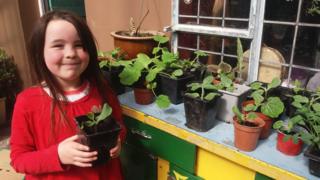[ad_1]

Image copyright
Tara Sutton
Tala Sutton and her younger sister Sirena are growing plants in mid Wales
Jere Gettle’s garden seeds company hadn’t seen anything like it before.
“The biggest day we’ve had in our 22-year history was Monday, 30 March,” says the owner of Baker Creek Heirloom Seeds in Mansfield, Missouri. “We had over 10,000 orders, up 10 times on what our normal would be. It was totally overwhelming.”
When most of the world went into lockdown in March, in response to the coronavirus pandemic, the fear of food shortages was an immediate concern for many of us.
You suddenly had to queue to get into supermarkets, and when you finally got inside it was only to find that shelves had been stripped bare by panic buyers.
For a great many people it appears that their reaction was to decide to start growing their own vegetables. Helpfully, it was the start of spring planting season in the northern hemisphere.
Seed sales have soared since the start of the pandemic
Mr Gettle’s company, the largest seller of heritage variety vegetable and flower seeds in the US, ran out of half of its stock, as buyers rushed to its website so they could grow everything from tomatoes to potatoes, and spinach to corn.
“The whole seed industry hasn’t seen anything like this since the Great Depression,” he explains.
He says that the last time his business saw a similar, but smaller, spike in sales was after the 2008 recession, and following the 1999 “millennium bug” fears.
“And it’s not just food [this time]. It’s flowers, herbs, everything is selling at unbelievable rates.”
Image copyright
Baker Creek Heirloom Seeds
Baker Creek Heirloom Seeds now intends to buy enough stocks to last for five years
In the UK it is a similar picture at the Seed Co-operative, a business that is owned and run by its members.
Due to what it says is “exceptional demand”, at a time when staffing numbers are lower, it is having to limit the time its website is open for online sales to a window of just two hours every Sunday evening.
David Price, the Seed Co-operative’s managing director, says that orders had been as much as six times higher than a year ago.
“We’ve had good levels of stock, but lots of others are now running out,” says Mr Price.
He is concerned that current demand for seeds could mean that supplies are limited in the coming years.
“We’re running on multi-annual production schedules, so it could become a real issue in a few years, when seed supply hasn’t had time to replenish.”
While the UK historically had hundreds of farming companies that specialised in seed production, the industry has dwindled. As a result, Mr Price says UK firms like his have to source most of their supplies from the Netherlands and Germany.
The Netherlands is, in fact, the world’s largest exporter of seeds for cultivation, followed by the US, France and Germany.
While people who have their own gardens obviously have an advantage when it comes to growing their own crops, windowsills can work fine for smaller plants and vegetables.
In Berlin, Alica Ferrer and her friend Lena Müller launched their indoor gardening box business Gruneo just two weeks before coronavirus hit Europe.
Image copyright
Gruneo
Gruneo’s boxes are designed for windowsills
A fortnight later they saw online interest soar for their herb and vegetable boxes, which include a chilli plant, lettuce and cherry tomatoes.
Ms Ferrer says she came up with the idea for the start-up after she started to grow her own food inside her Berlin apartment.
Gini, one of Gruneo’s first customers, bought a herb box as a gift to her grandfather Bernd, who previously had a big garden, before he eventually had to downsize.
“He is not the guy for buying salad at a grocery store,” says Gini. “But home-grown lettuce and tomatoes are a total game changer.”
While more of us are growing vegetables at home as a result of coronavirus, online sales of flower seeds have also soared, as both the Seed Co-operative and Baker Creek Seeds confirm.
Global Trade
More from the BBC’s series taking an international perspective on trade:
Perhaps people stuck at home simply have more time on their hands, and are therefore focusing more on their gardens. Or maybe the continuing pandemic is making people appreciate the simple joys of nature more.
Scottish firm Kabloom, which sells wildflower “seedboms”, says it has seen its sales soar tenfold since the end of March. Its starch-based, compostable, hand-grenade shaped plantable containers are full of compost and seeds.
In the Dyfi Valley, in mid Wales, sisters Tala Sutton, eight, and Sirena, five, have joined a community-wide scheme to grow more flowers.
“I quite like watching the plants grow,” says Tala. “I can’t wait to see how big my sunflower gets!”
Image copyright
Tara Sutton
Five-year-old Sirena Sutton says: “It feels good planting seeds and waiting for the flowers and food”
Back at Baker Creek, Mr Gettle now plans to source a five-year supply of seeds rather than his previous two years. He says that the global seed industry “needs to build a bigger safety net”.
Getting seeds to farmers is obviously most vital, and the International Seed Federation, which represents the industry, says its members are continuing to work hard to make sure supplies are uninterrupted as the pandemic continues. “The seed sector belongs to the category of essential services, and continues [to] work to sustain the delivery of seed to farmers,” it says.
But if you aren’t a farmer, and you fancy trying your hand at growing your own vegetables, what should you try first?
Mr Gettle suggests beginning with beetroots.
“Start with beets, which are fun, and easy to grow,” he says. “You may have bad results [to begin with], but don’t give up.”
[ad_2]
Source link
